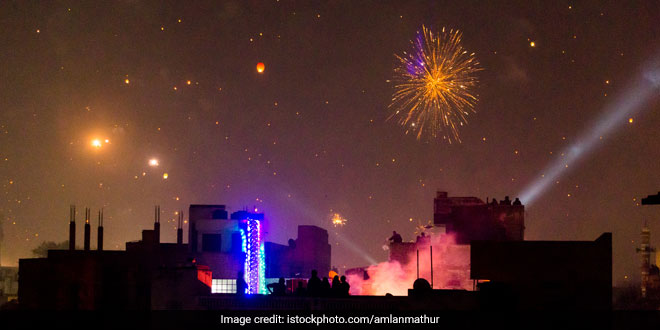New Delhi: Even as residents of the national capital contend with a poor air quality index, the bursting of crackers on Diwali will escalate health hazards over the next few days, experts say. “Despite issuing warnings every year, no strict action is being taken from the health perspective. There is awareness among people against bursting crackers, but it will still happen. So, post Diwali for 2-3 days, there is a chance of increase in patients with breathing or other problems,” Dr Neeraj Jain of the chest medicine department at Sir Ganga Ram Hospital told IANS.
What fuels a firecracker is generally charcoal. Burning this, results in the release of a large amount of air pollutants, particularly Sulphur dioxide, carbon dioxide, carbon monoxide (CO) and particulate matter into the atmosphere. These get lodged in people’s lungs, and there’s an immediate danger for those with asthma or chemical sensitivities.
The type of pollution that arises from crackers is different from that of particles like PM 2.5 and PM 10 in the air. However, the cracker pollution will add to the particulate matter, Dr Vijay Hadda, Associate Professor of Pulmonary Medicine at AIIMS, added.
“The toxic chemicals released from bursting crackers are ejected in high and dense concentration. Sudden exposure to such amount of toxic gas can be extremely harmful,” Dr. Hadda noted.
Also Read: Pollution Free Diwali: Ditch Regular Earthen Lamps And Switch To Eco-friendly Diyas
Talking about the hazards that pollution and firecrackers create, Dr Hadda pointed out that the concerns remain more or less the same, but what differs is the duration and time frame.
The problem arising from bursting of crackers may remain on health for one or two days while that of air pollution is of long term. However, chemicals emitting out of crackers can have an immediate effect on health while in the case of pollution it has a steady impact, Dr Hadda said.
According to the experts, people who are already facing breathing trouble like asthma or bronchitis are at a higher risk of facing danger from the combined pollution.
It will be wrong to say that there has been a rise in new cases. Of course, owing to bad air quality people did visit with health issues but few were fresh cases. Most of the patients who are already diagnosed with asthma or bronchitis or allergic to dust have been coming. Their frequency of visiting the hospitals has increased, Dr D.K Sharma of the Medicine department at Ram Manohar Lohia added.
Apart from people with asthma or lung infections, experts noted that children and senior citizens who have higher chances for facing breathing trouble owing to pollution caused during Diwali.
The harmful pollutants coming out from burning crackers enhance the inflammation within the respiratory system. Although the health hazards are temporary, it may turn life threatening if someone has severe asthma or other major breathing problem. In case of emergency, it is always advisable to rush to hospital, Dr Sharma stated.
Talking about the several masks available in market which can be used as a precautionary measure to reduce the intake of harmful particles, the doctors said the N95 is of help and can be used.
“The plain cotton ones or other masks are not effective at all. If not using a mask, then it is advisable to stay indoors as much as possible and avoid going out during early morning and late night,” Dr Jain suggested.
NDTV – Dettol Banega Swachh India campaign lends support to the Government of India’s Swachh Bharat Mission (SBM). Helmed by Campaign Ambassador Amitabh Bachchan, the campaign aims to spread awareness about hygiene and sanitation, the importance of building toilets and making India open defecation free (ODF) by October 2019, a target set by Prime Minister Narendra Modi, when he launched Swachh Bharat Abhiyan in 2014. Over the years, the campaign has widened its scope to cover issues like air pollution, waste management, plastic ban, manual scavenging and menstrual hygiene. The campaign has also focused extensively on marine pollution, clean Ganga Project and rejuvenation of Yamuna, two of India’s major river bodies.






























